- Home
- Hermann Hesse
Klingsor's Last Summer Page 13
Klingsor's Last Summer Read online
Page 13
He laid his forehead and his aching eyes against the cool iron railing. That refreshed him for a moment. In a year perhaps, or sooner, these eyes would be blind and the fires in his heart extinct. No, no human being could endure his flaming life for long. Not even he could, not even Klingsor, who had ten lives. Nobody could go on for a long time having all his candles burning day and night, all his volcanoes flaming. Nobody could be ablaze day and night, working feverishly for many hours every day, spending many hours every night in feverish thoughts, forever enjoying, forever creating, forever with all his senses and nerves wide awake and alert, like a palace behind whose every window music rings out day after day, while night after night a thousand candles twinkle. It would come to an end. A great deal of strength had already been squandered, much eyesight consumed, much life bled away.
Suddenly he laughed and stretched. He remembered that he had often before felt like this, often before thought these thoughts, had these fears. In all the good, fruitful, and ardent periods of his life, even in his youth, he had lived like this, had burned his candle at both ends, with a half jubilant, half mournful feeling of wild extravagance, of burning himself up, with a desperate greed to empty the cup to the dregs, and with a deep, hidden dread of the end. Often before he had lived like this, often drained the cup, often burned with high, darting flames. Sometimes these spells had ended gently, in something like a deep, unconscious hibernation. Sometimes the letdown had been terrible, senseless devastation, intolerable pain, doctors, sad renunciations, victory of weakness. And, granted, each time the end of such a period of intensity had been progressively worse, blacker, more shattering. However, he had always survived these lows and after weeks or months, after agony or stupefaction, the resurrection had come, new fire, new eruption of the underground volcanoes, new and more passionate works, new, glittering frenzy. That was how it had been, and the times of torment and subsidence, the agonizing intervals, had been forgotten and had vanished. It was good that way. This time, too, it would go as it had often gone.
Smiling, he thought of Gina, whom he had seen this evening, around whom his thoughts had revolved affectionately all the long walk home through the night. How beautiful this girl was, and how warm in her still inexperienced and timorous ardor. Playfully and tenderly he murmured under his breath, as if he were again whispering into her ear: “Gina! Gina! Cara Gina! Carina Gina! Bella Gina!”
He stepped back into the room and turned the light on again. From a small, haphazard heap of books he took a volume of poems. A poem had come to his mind, a fragment of a poem which seemed to him inexpressibly lovely. He searched for a long time before he found it:
Do not leave me to my sorrow now,
Beloved, do not leave me to the night.
Oh, you who are my match, who are my candle,
You who are my sun, who are my light.
With deep enjoyment he sipped the dark wine of these words. How lovely, how tender and magical it was: Oh, you who are my candle. And: You who are my sun.
Smiling, he paced back and forth in front of the tall windows, reciting the verses, calling them out to the distant Gina: “Oh, you who are my light!” His voice darkened with tenderness.
Then he opened the portfolio he had carried with him all evening after his long day of work. He opened the sketchbook, looked at the last pages, the ones he had done yesterday and today. There was the cone-shaped mountain with the deep shadows of cliffs; he had rendered it so it looked very like a crazy masked face. The mountain seemed to be screaming, splitting open from pain. There was the small stone fountain, a semicircle on the mountain slope, the masonry arch filled with black shadows, a flowering pomegranate tree blazing above it. It was all there for him alone to read, a cipher for himself, hasty, greedy notation of the instant, swiftly snatched recollection of every moment in which nature and his heart sounded newly and loudly in concord. And now came the larger colored sketches, white sheets with luminous areas of watercolor: the red villa in the woods, with a fiery glow like a ruby on green velvet, and the iron bridge at Castiglia, red against the blue-green mountain, the violet dam beside it and the pink road. Further: the chimney of the brickworks, red rocket against light, cool tree-green, blue signpost, brilliant violet sky with the thick cloud like rolled steel. This sheet was good; it could stay. Things had gone less well with the wagon road to the stable; the reddish brown against the steely sky was right, it spoke and sounded, but the picture was only half finished. The sun had shone on the paper and made his eyes ache maddeningly. For a long while afterwards he had bathed his face in a brook. Well, the brown-red against the malignant metallic blue was there; that was good, was not the smallest nuance, not the slightest vibration wrong or off. Without Indian red he couldn’t have brought that off. There, in this field, lay the secrets. The forms of nature, their top and bottom, their thick and thin, could be shifted around; you could discard all the commonplace means for imitating nature. You could falsify colors too, of course; you could intensify, lower, translate them in a hundred different ways. But if you wanted to use color to create a fictional nature, what mattered was that the few colors stood exactly, with the utmost exactitude, in the same relationships, in the same tensions to one another as they did in nature. Here you remained dependent, here you remained a naturalist, even though you took orange instead of gray and carmine instead of black.
So then, another day had been squandered and the yield was meager. The study of the factory chimney and the jotting in red and blue and perhaps the sketch of the fountain. If it were a cloudy day tomorrow he would go to Carabbina; there was that portico where the women came to do their laundry. Perhaps it would rain again tomorrow; then he would stay home and begin working on the picture of the brook in oils. And now to bed. It was past one o’clock again.
In the bedroom he pulled off his shirt, slapped water over his shoulders so that it dripped down on the red tile floor, jumped into the high bed, and put out the light. Pale Monte Salute looked in through the window. A thousand times Klingsor had traced its forms from his bed. An owl cried from the wooded gorge, deep and hollow, like sleep, like forgetfulness.
He closed his eyes and thought of Gina, and of the portico with the washtubs. God in heaven, so many thousands of things were waiting, so many thousands of cups stood ready poured. Not a thing on earth that he should not have painted. Not a woman in the world whom he should not have loved. Why did time exist? Why always this idiotic succession of one thing after another, and not a roaring, surfeiting simultaneity? Why was he now lying alone in bed again, like a widower, like an old man? You could enjoy, could create, all through this short life; and yet at best you were always merely singing one song after another. The whole full symphony with all its hundred voices and instruments never sounded all at once.
Long ago, at the age of twelve, he had been Klingsor with the ten lives. The boys played a game of robbers, and each of the robbers had ten lives. Each time you were tagged by your opponent or touched by his thrown javelin, you lost one life. But the game went on as long as you had six, three, even one single life left. Only when you lost the tenth were you out. But he, Klingsor, had made it a matter of pride to win through without losing any of his ten lives and would consider himself disgraced if he came out with nine or with seven. That was how he had been as a boy, in that incredible period when nothing in the world was impossible, nothing in the world was difficult, when everybody loved Klingsor, when Klingsor commanded everyone, when everything belonged to Klingsor. And that was how he had gone on, always living with ten lives. And although the surfeit, the full roaring symphony, could never be attained—still his song had not been single-voiced and impoverished. He had always had a few more strings to his bow than others, a few more irons in the fire, a few more coins in his purse, a few more horses on his cart. Thank God!
How full and vibrant the dark stillness of the garden was, like the breathing of a sleeping woman. How the peacock screeched. How the fire burned in his breast, how his heart po
unded and cried and suffered and rejoiced and bled. It had been a good summer after all up here in Castagnetta. He lived gloriously in his noble old ruin, looked gloriously out on the caterpillar backs of the innumerable chestnut groves below. It was lovely to descend eagerly now and then from this noble old world of woods and castles and look at the gay colorful toys down below and paint them in their good gay gaudiness: the factory, the railroad, the blue streetcars, the advertising column by the dock, the strutting peacocks, women, priests, automobiles. And how lovely and tormenting and incomprehensible was this feeling in his breast, this love and flickering craving for every bright ribbon and rag of life, this wild sweet compulsion to see and to shape, and yet secretly at the same time, under thin lids, the deep-felt knowledge of the childishness and vanity of all he did.
Fevered, the brief summer night melted away. Vapor rose from the green depths of the valley, sap simmered in a hundred thousand trees, a hundred thousand dreams swelled up in Klingsor’s light slumber, his soul strode through his life’s hall of mirrors where all images were multiplied and each time met one another with new faces and new meanings and entered into new associations, as though a firmament were being shaken in a dice cup.
One dream image among the many delighted and greatly stirred him. He lay in a forest and had a woman with red hair across his lap, and a black-haired woman leaned against his shoulder and another knelt beside him, holding his hand and kissing his fingers, and everywhere, all around, were women and girls, some still children, with long thin legs, some nubile, some mature and with the signs of knowledge and of fatigue in their restive faces, and all loved him and all wanted to be loved by him. Then war and fury erupted among the women, the red one thrust a raging hand into the black one’s hair and pulled her to the ground and was herself dragged down, and all fell upon one another, each one screaming, each tearing, each biting, each hurting, each suffering pain. Laughter, cries of fury and howls of anguish rang out intertwined and tangled, blood flowed everywhere, nails dug bloodily into fat flesh.
With a feeling of sorrow and depression Klingsor awoke for a few minutes. His eyes, wide open, stared at the bright gap in the wall. The faces of the embattled women still lingered, and he recognized and named many of them: Nina, Hermine, Elizabeth, Gina, Edith, Berta, and in a hoarse voice, still caught up in the dream, he said: “Children, stop it! You’re lying you know, you’re deceiving me, you know; it’s not each other you should be tearing to pieces but me, me!”
Louis
LOUIS THE CRUEL had dropped out of the blue. Suddenly he was there, Klingsor’s old friend, the traveler, the unpredictable wanderer who lived in railroad cars and whose studio was his knapsack. Good times dripped out of the blue on these days, good winds came. They painted together, on the Mount of Olives and in Cartago.
“I wonder whether all this painting business has any real value,” Louis said on the Mount of Olives, lying naked in the grass, his back red from the sun. “You know we only paint for lack of anything better to do, my friend. If you always had the girl you like best on your lap at the moment and your favorite soup in your plate, you wouldn’t bother with this senseless childish game. Nature has ten thousand colors and we’ve taken it into our heads to reduce the spectrum to twenty. That’s what painting is. We’re never satisfied and on top of everything else we have to help the critics earn their livings. On the other hand, a good Marseilles bouillabaisse, caro mio, and a simple lukewarm Burgundy along with it, and afterwards a piccata Milanese, pears and Gorgonzola for dessert, and Turkish coffee—those are realities, dear sir, those are values! How badly people eat in your Palestine here! Ah, I wish I were in a cherry tree and the cherries were growing into my mouth and just above me on the ladder stood the sun-tanned, spirited girl we met this morning. Klingsor, give up painting! I’m inviting you to a good meal in Laguno. It’s getting to be about time.”
“Do you mean it?” Klingsor asked, screwing up his eyes.
“I mean it. Only first I have to hurry over to the station. You see, to be truthful, I’ve telegraphed a woman friend that I am dying. She may arrive by the eleven o’clock train.”
Laughing, Klingsor tore the unfinished study off his easel.
“You’re right, my boy. Let us go to Laguno! Put on your shirt, Luigi. There’s great innocence to the morals here, but unfortunately you cannot go into town naked.”
They went into town, they went to the station; a beautiful woman arrived; they ate well in a restaurant and Klingsor, who had forgotten during his months in the country, was astonished that all these things still existed, these dear, cheerful things: trout, smoked ham, asparagus, Chablis, Valais Dôle, Benedictine.
After the meal all three of them took the cable railway up through the steep city, passing right between the houses, by windows and hanging gardens. It was very pretty. They stayed in their seats and rode down again, and up and down still again. The world was strangely beautiful and rare, highly colorful, somewhat dubious, somewhat improbable, but lovely. But Klingsor was a bit embarrassed; he put on an air of indifference, for he did not want to fall in love with Luigi’s beautiful friend. They dropped in at a café, they walked in the park, deserted in the afternoon heat, they lay down by the water under the huge trees. They saw a great deal that deserved to be painted: red houses like gems set in deep green, snakewood trees and smoke trees seared blue and brown.
“You have painted delightful and jolly things, Luigi,” Klingsor said, “things I’m very fond of: flagpoles, clowns, circuses. But to me, the most precious of all is a spot on your picture of the carousel after dark. You know, high up in the night, far above the violet tent and far from all the lights is a cool, small flag, pale pink, so beautiful, so cool, so lonely, so horribly lonely! It’s like a poem by Li Po or Paul Verlaine. All the sorrow and all the resignation of the world is in that small, silly pink flag, and all good laughter at sorrow and resignation. Your life is justified for having painted that little flag. I count it one of your major achievements, that flag.”
“Yes, I know how you like it.”
“You like it yourself. Look, if you hadn’t painted a few such things, all the good food and wine and women and coffee would do you little good, you’d be a poor devil. But as it is you’re a rich devil and a hell of a good fellow whom people are fond of. You know, Luigi, I often think as you do: that all our art is merely a substitute, a painful substitute bought ten times too dearly for missed life, missed animality, missed love. But it really isn’t so. It’s altogether different. If we regard the things of the mind as merely paltry substitutes for missing sensuality, we’re overestimating the things of the senses. Sensuality isn’t worth a hair more than spirituality, and it’s the same the other way around. It’s all one, everything is equally good. Whether you embrace a woman or make a poem, it’s the same. So long as the main thing is there, the love, the burning, the emotion, it doesn’t matter whether you are a monk on Mount Athos or a man about town in Paris.”
Louis looked slowly across at him, his eyes mocking. “My boy, you’re gettin’ too fancy for me.”
* * *
They roamed the vicinity with their beautiful companion. Both of them were good at seeing; that they could do. Within the circuit of a few towns and villages they saw Rome, Japan, the South Seas, and rubbed out the illusions again with sportive fingers. Their whims kindled stars in the sky and extinguished them again. Through the lush nights they sent their globes of light rising. The world was a soap bubble, opera, joyous nonsense.
Louis the Bird flew on his bicycle through the hilly landscape, went here and there while Klingsor painted. Klingsor threw away a good many days; then again he would sit resolutely outside and work. Louis did not want to work. Louis left all of a sudden, together with his woman friend; he sent a postcard from far away. Suddenly he was back, when Klingsor had already given him up for lost. He stood at the door in straw hat and open shirt as if he had never been away. Once again Klingsor drained the drink of friendship from the sweetest c
up of his youth. He had many friends, many loved him; he had given much to many, opened his impulsive heart to many. But this summer only two of his friends heard the old cry of his heart fall from his lips: the painter Louis and the writer Hermann, called Tu Fu.
Many a day Louis sat in the field on his painting stool, in the shade of the pear tree, in the shade of the plum tree, and did not paint. He sat and thought, kept paper clipped to the easel and wrote, wrote a great deal, wrote many letters. Are people who write so many letters happy? He wrote strenuously, Louis the Nonchalant; for hours at a time his eyes clung devotedly to the paper. Much that he concealed churned within him. Klingsor loved him for that.
Klingsor behaved differently. He could not keep silent. He could not conceal what lay in his heart. He let his intimates know the secret pangs of his life. Often he suffered from anxiety, from melancholia; often he lay bound and gagged in the dungeon of darkness. Sometimes shadows from his earlier life fell upon his days, casting them in gloom. Then it did him good to see Luigi’s face. Then, sometimes, he would vent his feelings to him.
But Louis did not like to see these weaknesses. They pained him, they demanded sympathy. Klingsor made it a practice to reveal his heart to his friend, and realized too late that in so doing he was losing him.
Again Louis began to talk of departure. Klingsor knew that he would be able to hold him only for a few days, for three, perhaps five. Then suddenly Louis would show him his packed suitcases and leave, and not be back for a long time. How short life was, how irrevocable everything was. Louis was the only one of his friends who fully understood his art, whose own art was close to his and equal to it. Now he had spoiled things with this only friend, had chilled him and put him out of sorts, merely out of stupid infirmity and slackness, merely out of the childish and unseemly impulse to spare himself trouble, to keep no secrets, to throw aside dignity. How silly, how boyish that had been. Thus Klingsor berated himself—too late.

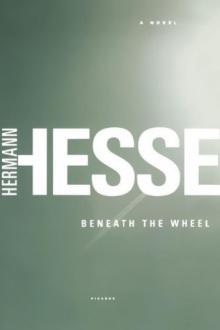 Beneath the Wheel
Beneath the Wheel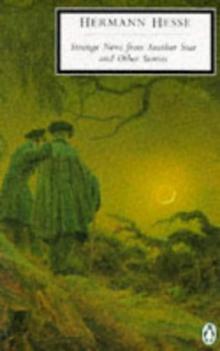 Strange News From Another Star
Strange News From Another Star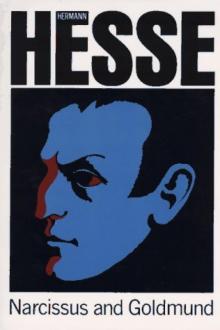 Narcissus and Goldmund
Narcissus and Goldmund Steppenwolf
Steppenwolf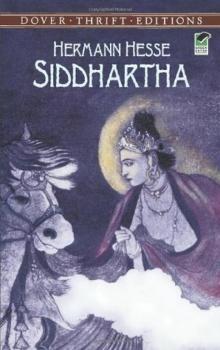 Siddhartha
Siddhartha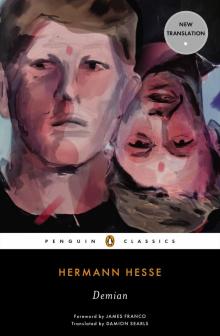 Demian
Demian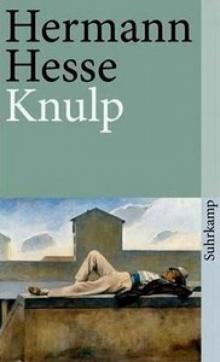 Knulp
Knulp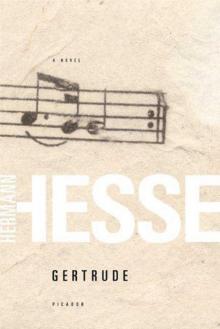 Gertrude
Gertrude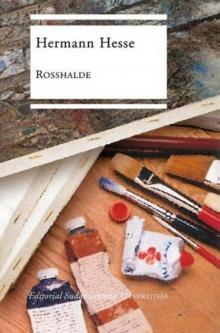 Rosshalde
Rosshalde The Glass Bead Game
The Glass Bead Game The Journey to the East
The Journey to the East Klingsor's Last Summer
Klingsor's Last Summer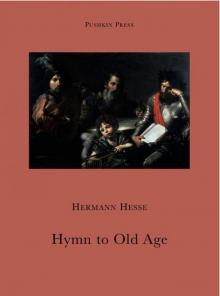 Hymn to Old Age
Hymn to Old Age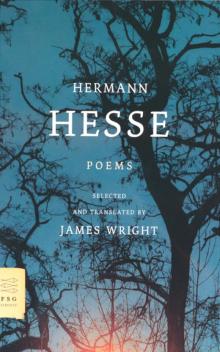 Poems
Poems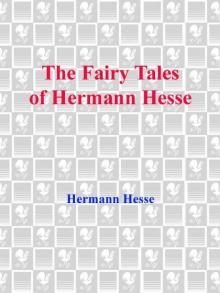 The Fairy Tales of Hermann Hesse
The Fairy Tales of Hermann Hesse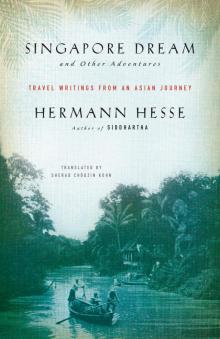 Singapore Dream and Other Adventures
Singapore Dream and Other Adventures Soul of the Age
Soul of the Age